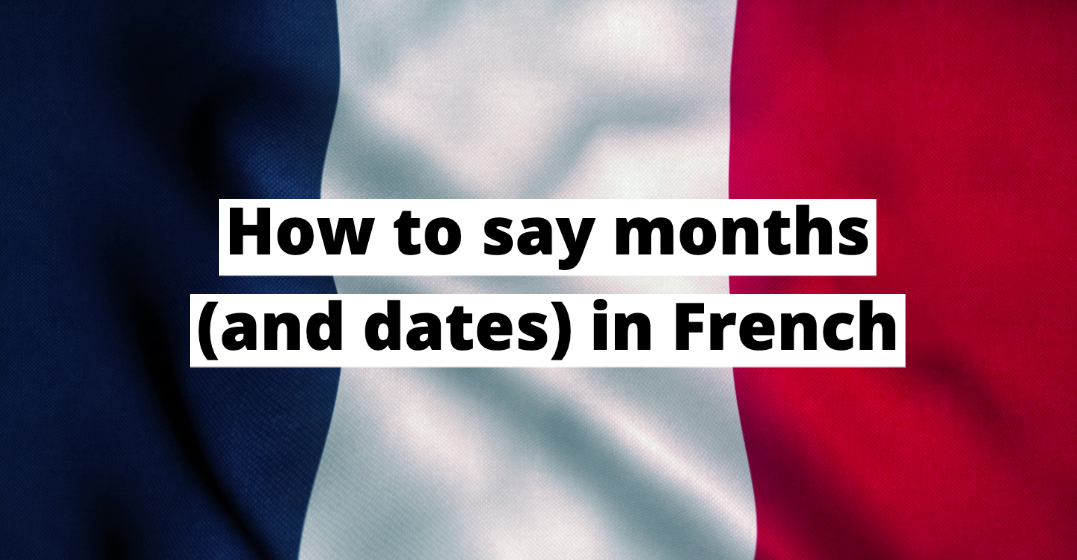Updated on January 8, 2024

How to say and write the date in French

You might think you can skip some of the basics when it comes to French, but don’t! When it comes to learning languages, it’s important to get confident with numbers. Not only are they very useful for giving your date of birth or planning an appointment, but they are also essential if you just want to say the date in French. So what do you need to know to be able to say the date in French? Here are the steps to follow!
This is the first step: as the months have a maximum of 31 days, you have to memorize the numbers in French up to 31. These are the numbers you probably already know, the so-called cardinal numbers (unlike the ordinal numbers used in English).
| 2 = deux 3 = trois 4 = quatre 5 = cinq 6 = six 7 = sept 8 = huit 9 = neuf 10 = dix 11 = onze 12 = douze 13 = treize 14 = quatorze 15 = quinze 16 = seize | 17 = dix-sept 18 = dix-huit 19 = dix-neuf 20 = vingt 21 = vingt-et-un 22 = vingt-deux 23 = vingt-trois 24 = vingt-quatre 25 = vingt-cinq 26 = vingt-six 27 = vingt-sept 28 = vingt-huit 29 = vingt-neuf 30 = trente 31 = trente-et-un |
There’s only one exception: it’s number one. In French, we use the ordinal number “premier” and not the cardinal number “un” this time, for example:
The days of the week in French are composed a bit in the English way with the suffix “-di” at the end (which comes from Latin and means “day”). However, it is not capitalized.
Monday — lundi
Tuesday — mardi
Wednesday — mercredi
Thursday — jeudi
Friday — vendredi
Saturday — samedi
Sunday — dimanche
The Romans gave the days of the week the names of the seven stars they knew:
lundi → Day of the Moon (la Lune)
mardi → Day of Mars
mercredi → Mercury
jeudi → Jupiter
vendredi → Venus
However, with the Christianization of Gaul, Saturn disappeared in favor of the Sabbath, hence samedi (sambati dies), while the day of the Sun was replaced by the day of the Lord (dies dominicus) which became dimanche. The Anglo-Saxon countries have kept the original forms for the last two days of the week.
January — janvier
February — février
March — mars
April — avril
May — mai
June — juin
July — juillet
August — août
September — septembre
October — octobre
November — novembre
December — décembre
The months in French are quite similar to the month in English, but like the days of the week, they are not capitalized. Be careful with pronunciation, however, some months are more difficult to pronounce than others.
To say the year in French, you’ll need to know all the numbers! Because the French pronounce the year as an entire number, for example:
1998: mille-neuf-cent-quatre-vingt-dix-huit
This is a year dear to the French, as the national football team won its first world cup!
14 juillet 1789: quatorze juillet mille-sept-cent-quatre-vingt-neuf
Hope you’re not in a hurry… it’s long and there’s no way to shorten it. Unless you’re talking about your year of birth, we can say:
« Je suis née en 86 (quatre-vingt-six). » – I was born in ’86 (eighty-six).
This is one of the most common doubts: in what order should the date be said in French?
Let’s take the same example, the day of the French Revolution, which is now the French national holiday: 14 juillet 1789
When you give a date in French, you have to start with the day, then the month and finally the year. Nothing else is added.
To say the date, you’ll need the article “le”:
“le” + (day) + number
To say the day, you also have several possibilities:
Aujourd’hui, c’est lundi. – Today is Monday.
Aujourd’hui, on est lundi.
And you have to distinguish the meaning of these two sentences:
Lundi, je me lève à 6h. Le lundi, je me lève à 6h. (I get up at 6 o’clock)
Samedi, je vais au cinéma. Le samedi, je vais au cinéma. (I go to the movies.)
>> Lundi : this Monday (only) >> le lundi : every Monday. (regular activity)
For the months, you still have two ways to announce them:
En janvier, en août… Or Au mois de janvier, au mois d’août…
For the years: only one preposition: “en”.
Je suis née en 1986. (I was born in 1986.)
The questions will depend on what you want to know. If you want to know:
The full date:
The day of the week:
For a more informal way of speaking, you can replace “nous sommes” with “on est”, which is more widely used in oral communication.
There, you are now able to talk about your birth, your appointments… And when is your next class with Lingoda scheduled? Prep for your classes with our 60 second French videos on YouTube.